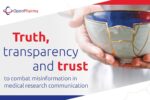This week, we launch our HCP OA survey and read the latest Open Pharma guest article about the United2Act initiative to protect research integrity. We also learn about cases of journals stealthily editing articles containing AI phrases, and we review the new COPE position statement on editorial independence. Finally, we explore how physicians are using AI to support their clinical practice and how medical publication professionals can use AI to augment their content.
To engage:
Open Pharma seeks HCP perspectives on OA via Open Pharma
Open Pharma is excited to announce a collaboration with Healthcare Information For All to research healthcare professionals’ (HCPs) experiences of open access (OA) publishing. Help us understand your views on OA publishing (i.e. how you find and use research articles available at no cost to the reader) by completing this short, 10-minute survey. Insights from this survey will be disseminated at a future congress and will be used to inform improvements in publishing practices.
To read:
United2Act: safeguarding pharma research integrity via Open Pharma | 7-minute read
Paper mills are infiltrating the medical literature at an alarming rate, threatening evidence-based medicine, risking patient safety and undermining pharmaceutical innovation. In this article for the Open Pharma blog, Jason Hu (Chair of Working group 1: increase education and awareness at United2Act, Council Member of COPE, and Director of Research Integrity Engagement at Taylor & Francis) examines how these operations exploit the scholarly ecosystem and their devastating consequences, and how the pharma industry can lead the fight to protect research integrity.
Stealth corrections of AI phrases in the scientific literature via Nature | 6-minute read
“Somehow this passed not only the authors’ eyes, but the editors, reviewers, typesetters and everyone else who was involved in the production process,” says Alex Glynn (Research Literacy and Communications Instructor at the University of Louisville, Kentucky, USA), recalling how he identified signature artificial intelligence (AI) phrases in a published paper. In this article, Diana Kwon (Freelance Science Journalist) explores how some journals are removing such phrases from the literature post publication without notice, leading to concerns about transparency and research integrity.
COPE position on editorial independence via COPE | 3-minute read
“Editorial independence is essential to maintain the integrity of scholarly communication,” begins this new Committee on Publication Ethics (COPE) Council position on editorial independence. Recognizing the importance of separating editorial decisions from ‘commercial, political, and societal influence’, the position calls for information about decision-making workflows and roles to be transparently disclosed and easily found on journal websites.
HCPs use AI to reduce administrative burdens via AMA | 5-minutes
Two-thirds of HCPs are using AI to support their clinical practice according to this American Medical Association (AMA) survey of 1183 practising physicians. Representing an increase of 78% from 2023, 66% of physicians surveyed reported using AI for at least one of 15 use cases presented, with 68% of respondents saying that AI is an advantage in patient care. Explore the full results in this report.
To listen to:
Augment your publications with AI via ISMPP | 22-minute listen
What is the role of generative AI in medical publishing? Listen to Stephen Griffiths (Publications Head, General Medicine and Speciality Care at GSK), Stephanie Preuss (Director of Content Innovation at Springer Nature) and Stephen Rowley (Patient Advocate and Director at Artension) as they explore ways to integrate AI during the creation and dissemination of research outputs. Host Rob Matheis (President and CEO at the International Society for Medical Publication Professionals [ISMPP]) invites his guests to discuss their most compelling AI use cases, best practices for transparent disclosure of AI use, and their insights on how AI will shape the future of patient care.
Enjoy our content? Read last week’s digest and check out our latest guest post!
Don’t forget to follow us on Bluesky and LinkedIn for regular updates!






